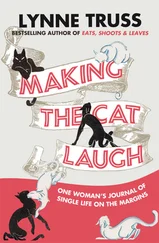LYNNE TRUSS
Going Loco
A Comedy of Terrors
To Mum, who never had the choice
Cover
Title Page LYNNE TRUSS Going Loco A Comedy of Terrors
Part One Part One
One
Two
Three
Four
Five
Six
Part Two
Seven
Eight
Nine
Ten
Part Three
Eleven
Twelve
Thirteen
About the Author
By the same author:
Copyright
About the Publisher
Part One
Since being the heroine of her own life was never quite to be Belinda’s fate, we may as well begin with Neville. Belinda was a real person, while Neville was an imaginary rat with acrobatic skills; but since he inhabited the pit of her stomach, their destinies were inextricable. Since Christmas, at least, they had started each day together, and if either performed an action independently – well, neither knew nor cared. Belinda would wake, and at the first choke of anxiety concerning the day to come, Neville commenced preliminary tumbling. Belinda clutched her throat; Neville donned a body stocking and tested his trampoline. It was pretty alarming sometimes, a bit too vivid, especially for someone who had never been particularly drawn to the romance of the Big Top. But she had no control over it. By the time Belinda was dressed and committed to the beat-the-clock panic that seemed to have become her waking life, Neville was juggling flaming brands on a unicycle and calling authentic acrobat noises such as ‘Hup!’ and ‘Hip!’ and ‘Hi-yup!’
Belinda did once mention Neville to Stefan, but since her husband’s own alimentary canal had never been domicile to a rat in spangles, he didn’t know how to react. Being a clever Swedish person, he was eager to learn new idioms, new English phrases, which was why Belinda sometimes gambled that he might understand something emotionally foreign to him as well. But when Belinda complained, ‘And now I’ve got a rat in my stomach,’ he had merely looked up from his book, sighed a bit, and turned down the volume on Abba: Gold.
‘A rat?’ he queried. ‘This is a turned-up book.’
‘Mm,’ she agreed.
They listened to Abba for a bit. Stefan mouthed the words. Perhaps under the influence of the song, Belinda found herself staring at the ceiling, wishing she were somewhere else instead.
His scientific mind slid into gear. ‘What sort of rat? Rattus norwegicus?’
‘I don’t think so,’ she said. No, the name Neville had no ring of Scandinavia. ‘He’s more of an acrobatic rat. In tights. With a high wire and parasol.’
Stefan gave her one of his steady, serious smiles; she broke the gaze, as always, by pulling a silly face, because its intensity scared her.
‘You’re working too hard,’ he said, quietly. ‘Jack is a dull boy, I think.’
‘I know, I know. Of course I am. That’s what I’m trying to tell you.’
‘So why do you invent a rat? Why not say, “Stefan, my old Dutch, help. I’m working my trousers to the bone, but I just can’t beat the clock”?’
Belinda pouted. ‘I don’t think I did invent him. I can feel him doing back-flips.’
Abba started singing ‘The Name of the Game’. Stefan turned up the volume again.
At which point Neville walked on his front paws through her intestinal tract, gripping a beach-ball between his back feet.
‘Ta-da!’ he cried.
A couple of things need to be made clear about Belinda Johansson. First, she was not Swedish (obviously). Second, she was under the rather hilarious illusion that she had a hard life, when in fact she had an enviable existence as a freelance literary critic and creative writer in some demand, living in one of the better bits of South London. And third, if she saw an abandoned sock on the bathroom floor, she would glare at it defensively rather than pick it up and sling it into a laundry bag.
This last tendency may not sound too bad, but as any slattern can attest, neglected balled-up socks have a talent for embodying reproach. ‘I’m still here,’ the sock will tell you, in an irritating sing-song tone, on your next five visits to the bathroom. ‘I’m going crusty now. And I believe I missed the wash on Sunday morning.’ Belinda’s healthy intelligence would not allow her to be browbeaten by mouldy hosiery, which was why she wouldn’t stoop to silencing its reproaches by simply tidying it up. But add this insinuating sock to the pile of attention-seeking newspapers in the kitchen (‘We’re still here too, lady!’), the ancient wine corks accumulating fluff and grease (‘Remember us?’), and the deadline for her latest potboiler (‘Tuesday, or else’), plus the pressure on her long-term book on literary doubles (‘You bitch! I can’t do it on my own!’) and you begin to understand why Belinda was giving house room to the rat. The deadlines alone she might have managed. It was the cacophony of reproach from all fucking directions in this fucking, fucking house that she couldn’t tolerate much longer. It’s sad but true that, had Belinda’s DNA not tragically lacked the genetic code for basic household organization, none of the following story need have taken place.
You couldn’t feel sorry for her, and nobody did. Many women had more responsibilities than Belinda, with considerably fewer advantages. At the nice age of thirty-six, she lived in a nice, large Victorian villa in Armadale Road, Battersea, with a nice, rather entertaining Swedish husband she’d met well into her thirties. Her work was nice, too – compiling a serious literary book alongside more lucrative horsy stuff for girls. On this Monday morning in February she was about to deliver A Rosette for Verity and collect three thousand pounds. The Swede was a senior scientist, so the Johanssons had money. Only Stefan’s habit of perusing Over-reach Your English for Foreigners on the toilet each morning could be seen as a cause of strain.
Unfortunately, however, the justice of Belinda’s complaints was not the point. The point was, her body was a twenty-four-hour adrenaline pumping station. And at the time this story starts, Belinda’s behaviour was deteriorating badly. She had caught herself waving two fingers at the postman from behind the curtains, just because he innocently delivered more post. ‘Take it away,’ she yelled. ‘Don’t bring it, take it away!’ A magazine editor had rung up with the offer of a laughably easy horse-tackle column (she’d coveted it for years), and instead of saying, ‘That’s great!’, she’d barked, ‘Do you think I just sit here with my thumb up my bum waiting for you to ring? Get a life, for God’s sake.’ At the supermarket, she had rammed her trolley into that of a dithering pensioner, saying, ‘Look, have you got a job?’ In short, the flight-or-fight mechanism Nature gave Belinda for emergencies had gone horribly haywire, as if someone had removed the knob, and lost it.
Stefan would tell her to take off the weight, or hang loose. Stefan was one of those people who has a regular job – or even, in recidivist lapses, a ‘yob’ – who attends college in office hours, and comes home in the evening to relax. In about fifteen years, he would retire. True, a certain amount of research was required of him, but it was no skin off his nose, as he was proud of remarking. Why Belinda made such a meal of things, he didn’t know.
So things came to a head in that pleasant suicide month of February, on a Monday morning. Belinda was racing out of her agreeable house at nine thirty-five for a ten a.m. train from Clapham Junction, and there was (for once) the faintest chance she would make it. She felt terrible, afflicted by a painful and humiliating dream in which she had punched Madonna on the nose for hijacking her car, only to discover that the passengers were all disabled children. This was not the sort of dream to be dislodged easily. The children had waved accusing crutches at her through the car windows, and though she’d grovelled to Madonna, she’d woken unforgiven and felt like a murderer.
Читать дальше












